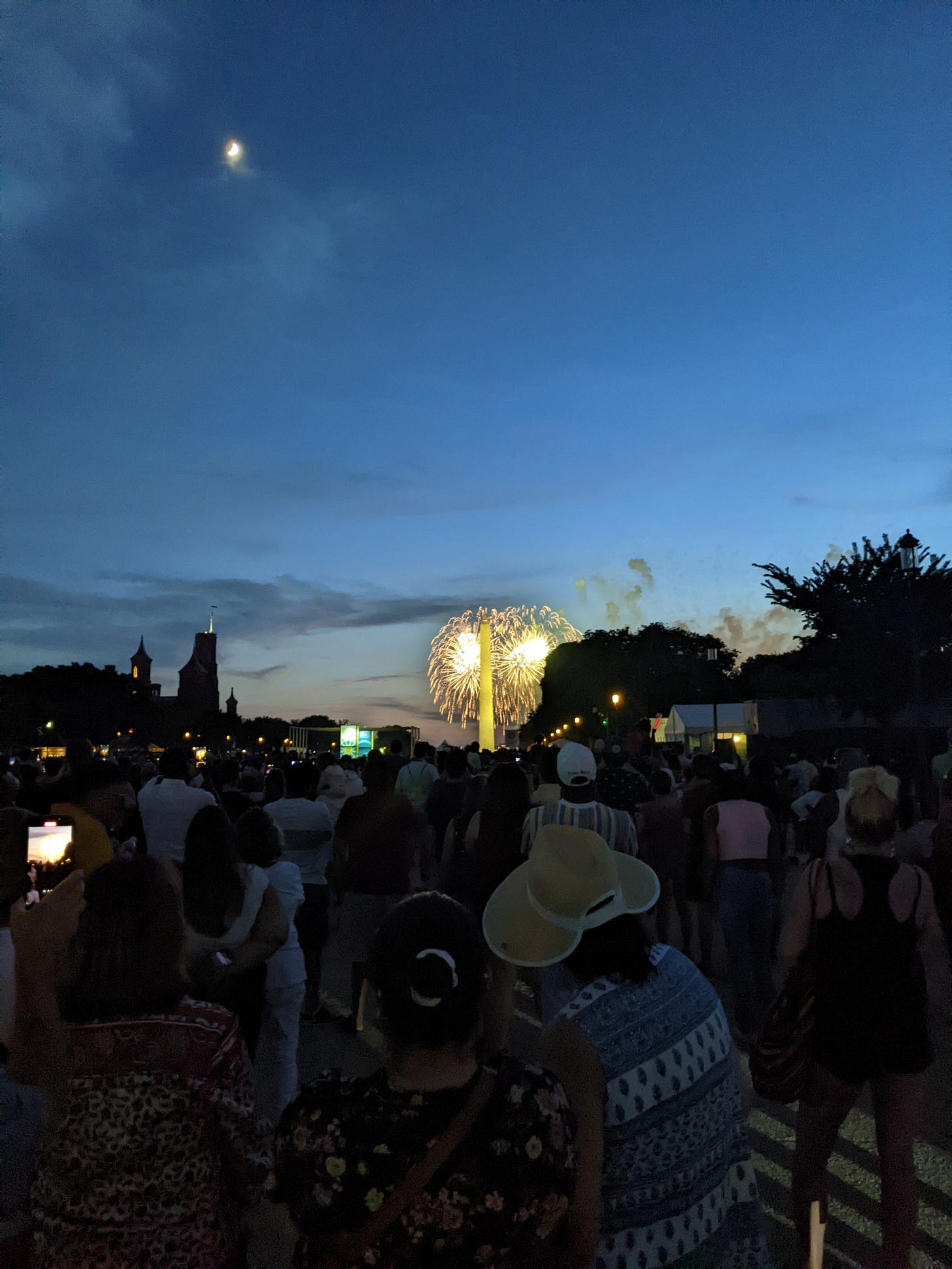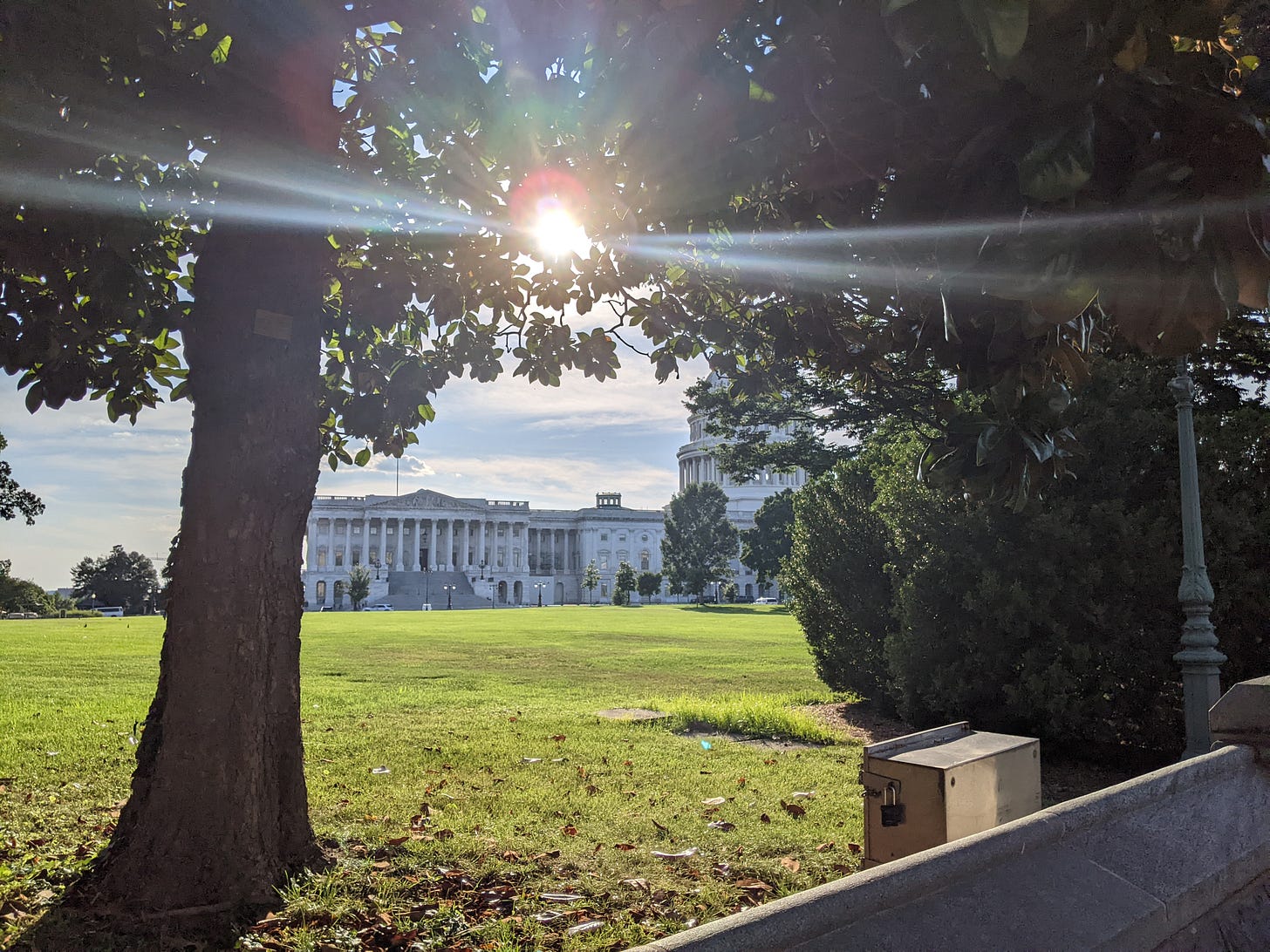America's Attention Problem
Individually Reclaiming Distracted Collective Memory
Given the last article, I thought to expand this topic a bit. I previously discussed the incumbent Speaker’s usage of “consensual spyware” as a potential attack vector for United States security and found that people and the media both generally stopped caring less than a week after the initial reports came out late last year. I could foreseeably take it in two directions from here: the first is that the modern media cycle is simply not conducive for applying pressure necessary for political change and the second is that the American public no longer participates in political activism in meaningful ways. This article will focus on the latter.
Back in 2022, I was trying to see and do the things in D.C. that I was not able to see and do during the pandemic. I had the unfortunate timing of moving to the area shortly before that global event occurred. However, I attempted to make up for lost time partially by making my way to the July 4th fireworks celebration at the National Mall. This particular day was notable both for marking the full return to some kind of normalcy in the yearly events of the nation’s capital, and for the extreme recency of the landmark Dobbs v. Jackson Women's Health Organization decision.
It seems to me that Americans feel detached from politics either from a notion of inertia (too much needs changing and bureaucracy is too slow to change) or from a perspective that the job is too large for them to handle; and, that is correct in a sense. It is not the job of the average American to fix the government nor is the responsibility theirs alone to bear. However, the government is supposed to be held accountable to the people, and if the government refuses to hold itself to enact what the average voter wants, then it falls to the people to try enforce that will. While many know the passage of the Declaration of Independence concerning “Life, Liberty, and the pursuit of Happiness,” few seem to acknowledge the very next sentence1.
--That to secure these rights, Governments are instituted among Men, deriving their just powers from the consent of the governed, --That whenever any Form of Government becomes destructive of these ends, it is the Right of the People to alter or to abolish it, and to institute new Government, laying its foundation on such principles sand organizing its powers in such form, as to them shall seem most likely to effect their Safety and Happiness.
This is the fundamental point of modern voting: cast votes are tabulated to appoint and remove individuals who do not appropriately represent the collective will of the people. Failing this process, e.g. if unelected government officials circumvent the will of the people to promote their own agendas, then the people subsequently are allowed to be upset with the outcome. No, this is not a call for revolution, but it is a call to acknowledge the fact that an increasing proportion of the American population is likewise increasingly dissatisfied with the structure and function of the government. There is even a generational aspect to it, where younger Americans are feeling the brunt of this2.
There is little doubting that the trust in the current Court is supremely troubled. As I witnessed these meager protests happening in front of the Supreme Court, knowing that hundreds of thousands3 of my closest friends were parked right next door waiting for the fireworks, three thoughts entered my mind as I stared at the inscription stating “equal justice under law.” The first being that, if Americans cared about abortion rights more than they cared about fireworks, then perhaps the Supreme Court never would have been able to overturn Roe v. Wade due to potential public outcry. The second being that Americans have seemingly largely forgotten how effective collective bargaining can be, and how much progress has been made due to prolonged public demonstrations. The third being that both of the above complacencies feel explicitly engineered (whether intentional or not, the feeling certainly comes across) from decades of media exposure and variably weak or selective protection for public and private demonstration.
So how do we change this?
The second of the above is actionable and worth discussing further. Collective bargaining efforts have encountered difficulty in recent years. Occupy Wall Street stalled and fizzled as participants failed to find a meaningful goal; even the George Floyd and Rodney King protests struggled to gain actionable traction outside of certain municipalities. Seemingly gone from the modern era are the winds of change found in women’s suffrage and the Civil Rights Movement. Yet we find ourselves in a state of perpetual dissatisfaction and disgruntlement at our current state of affairs, and unwilling or unable to take effort to change it. While a complete solution will take decades and generations to resolve, there is more we, the average Americans, can do now.
We need to advocate for the democratic process. America likes to live and die on principles, but we cannot forget the fact that these principles exist because we have built societal structures that allow us to have these principles. If actors wish to subvert or otherwise circumvent the democratic process, Americans must continue to use the tools of democracy to maintain that democracy. For the average American, that includes voting and nonviolent protests.
We need to update and remind each other about ongoing issues—no, it’s not enough to acknowledge that something happened or could happen. “Politics” isn’t an aloof, abstract concept that only affects us yearly when it comes time to file a tax return and every two-to-four years as some kind of infrequent football game. If the media cycle will not actively engage us until something “new” comes along, then we must push to keep each other engaged. Push for content updates on social media, push to keep momentum going in social spaces, and push to keep eyes on topics that need second, third, and fourth glances, rather than fall for the allure of slacktivism. In the words of Gil Scott-Heron, “the revolution will be live,” and change will not occur by occupying the sidelines and simply being a cheerleader.
We need a renewed sense of patriotism, not the trite kind that politicians often refer to, but a genuine interest in the nation: their neighbors beyond the block. This means building a renewed sense of community, no matter how long that takes. While there are many paths to this, one way we can start with is pushing for better transport infrastructure to bring people closer together. This can look like promoting public “third spaces” again, which have seen post-pandemic shrinkage (including promotion of libraries as prime-candidate resurgent social spaces4). As mentioned in the last article, we can be more open to listening to each other; agreement is not necessary, but genuinely getting to the root of people’s motives and emotions in interaction with those around us will be critical in moving forward.

The 4th of July is a symbol of national independence. But while this independent spirit has helped make the United States into what it is today, that independence was formed from collective action against a common cause. While there seems to be little that Americans can agree upon in public discussion, if most of us can look up and enjoy a fireworks show, then there must be other things that we can work on together. Reclaiming a collective understanding will be difficult task, but we as individuals need to start working on this too, if we want actual change.
All photos and videos included in this article © Alexander Treasure 2024. All rights reserved.
https://www.archives.gov/founding-docs/declaration-transcript
https://www.semafor.com/article/05/28/2024/a-dying-empire-led-by-bad-people-poll-finds-young-voters-despairing-over-us-politics
https://wtop.com/gallery/media-galleries/photos-thousands-gather-at-national-mall-for-july-4th-fireworks-over-dc/
https://www.statista.com/chart/32082/comparison-of-pre--and-post-pandemic-key-figures-for-selected-urban-libraries/



